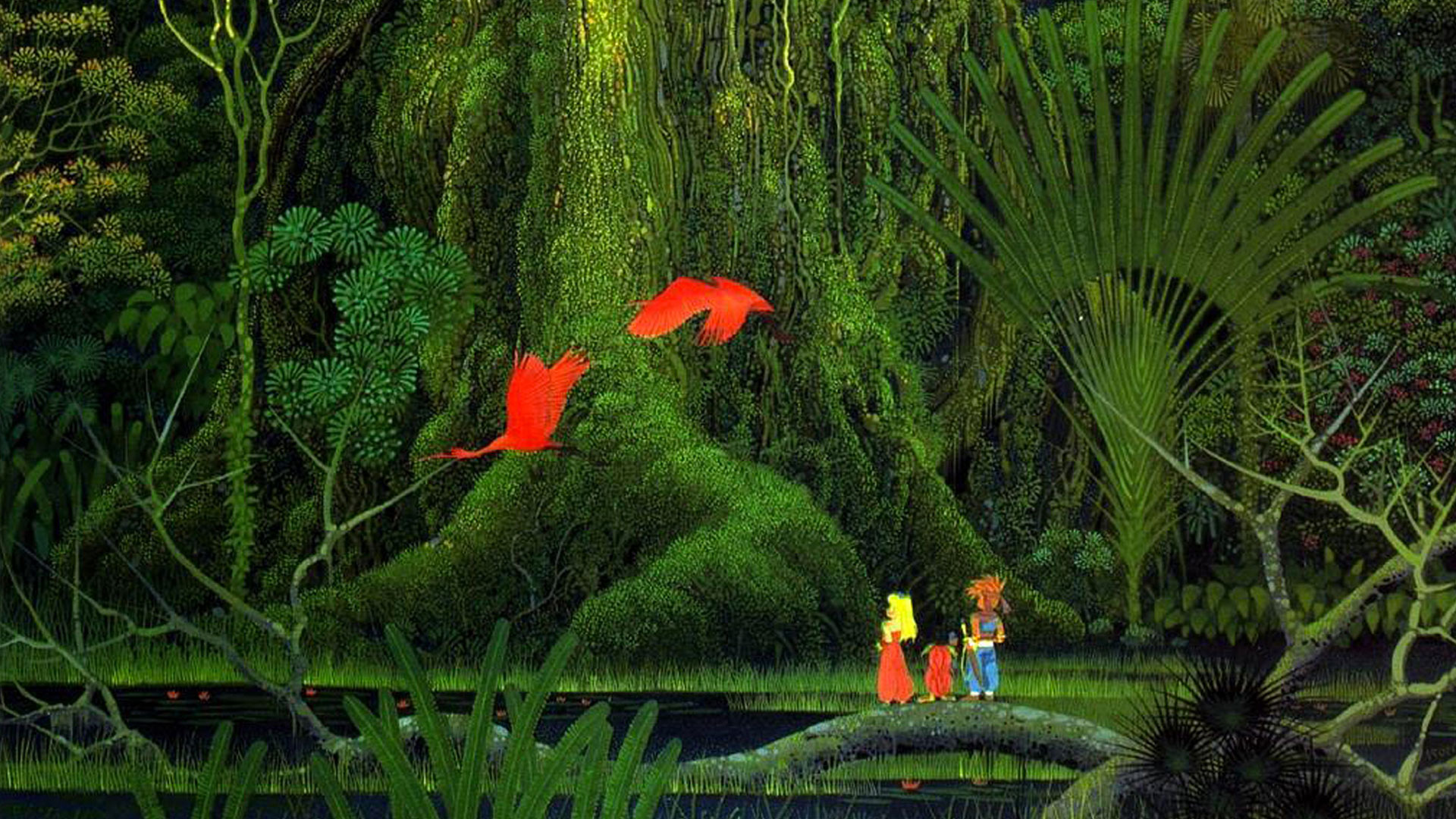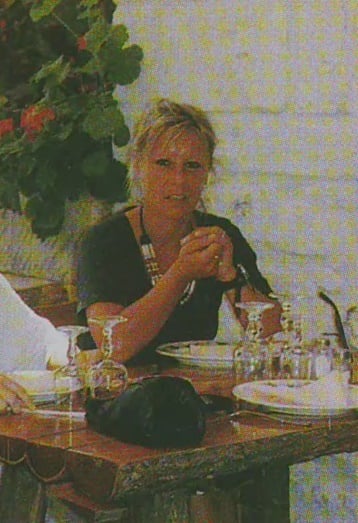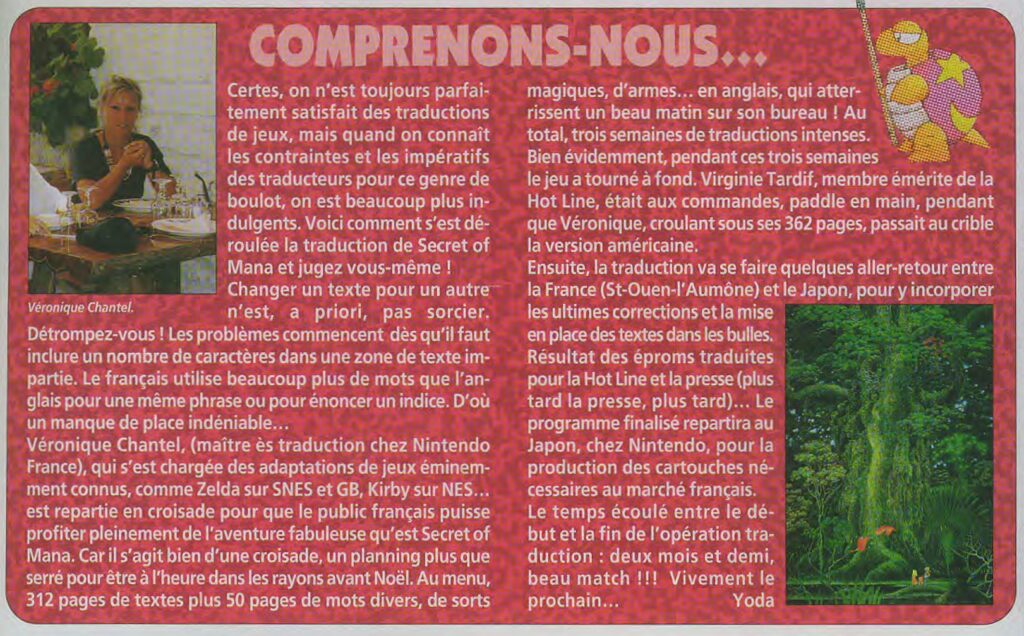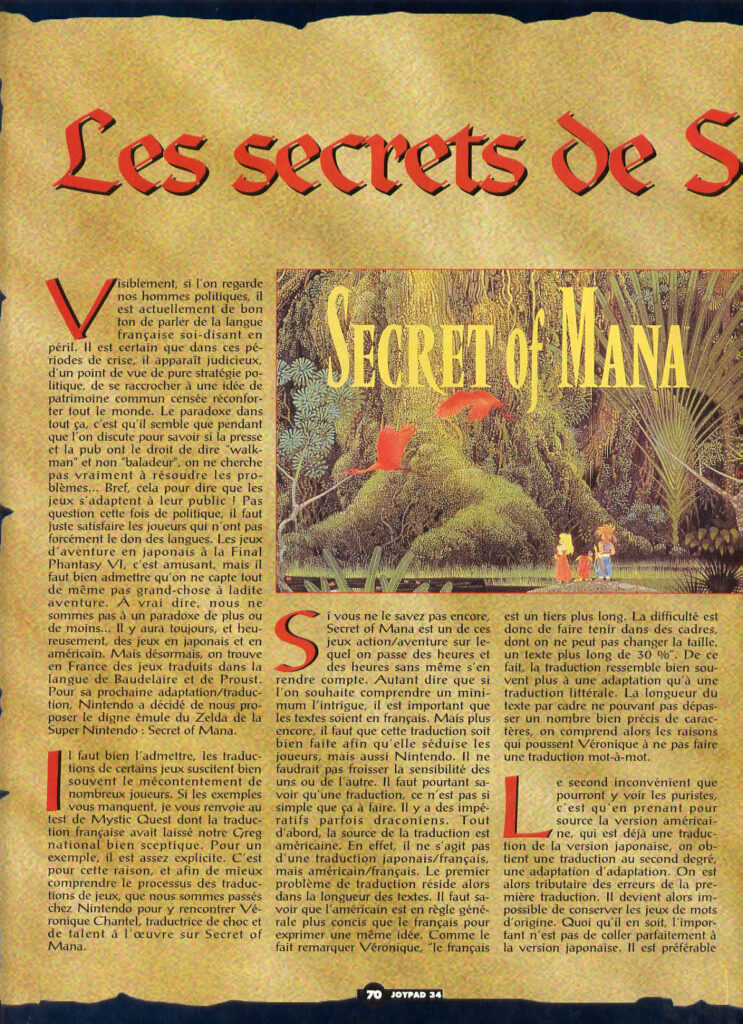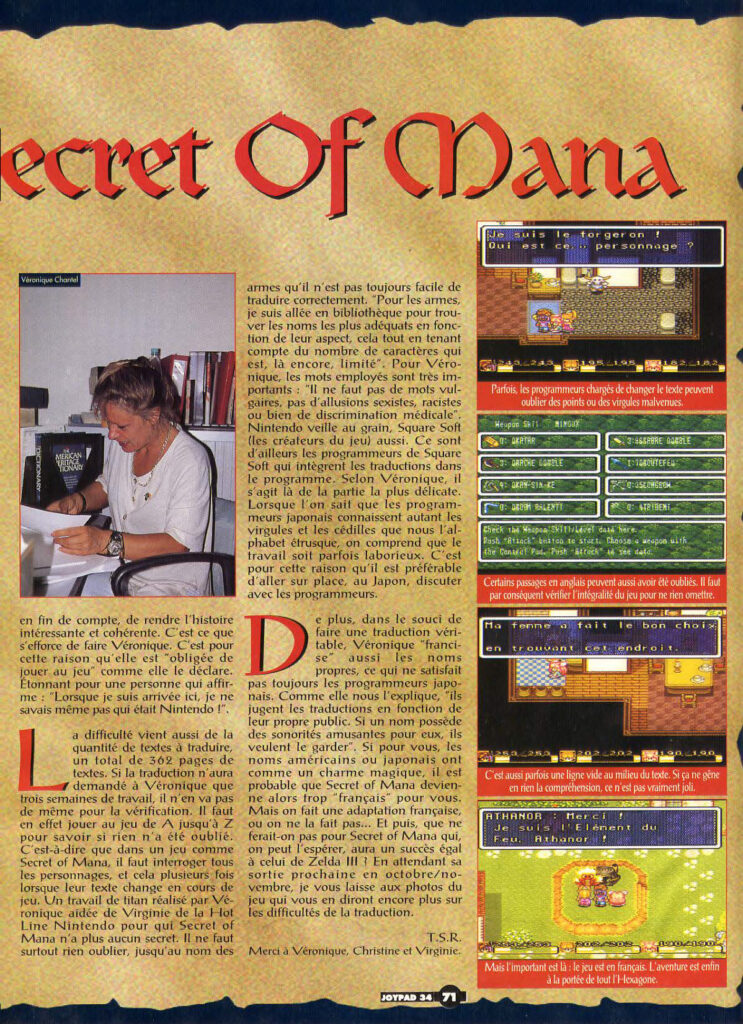Remembering Véronique Chantel (1957-2012) — Secret of Mana’s French Translator

Remembering Véronique Chantel (1957-2012) — Secret of Mana’s French Translator
December 30, 2024
You likely know of the quagmire that was translating Secret of Mana from Japanese to English, but you may not know that the French translation was even more of a mess. Véronique Chantel only had a few weeks to localize Ted Woosley’s English script (not the original Japanese!) so that enough French cartridges could be made by Christmas. Mme. Chantel disappeared from the public eye shortly after her unique work on Secret of Mana, and tragically passed away in 2012. However, she’s fondly remembered by French-speaking gamers for her work.
She was evidently reclusive enough that her former colleagues found out about her death years after the fact. From Alain Le Goff, a former technical advisor for Nintendo France:
C’est le cœur triste que j’ai appris aujourd’hui la mort de ma collègue et ami Véronique Chantel Notta par sa fille. Sa mort date d’il y a quatre ans maintenant, mais la vie fait souvent en sorte qu’on se perde de vue. Je me suis inscrit sur se groupe en début de semaine j’ai essayé de contacter Véronique (après quelques années j’avoue sans nouvelles) et j’ai appris par une de ses filles qu’elle était parti il y a quatre ans a cause de cette mauvaise maladie qu’est le cancer. Je ne garde que de bon souvenirs avec Véronique à l’époque ou je travaillais au club Nintendo. C’était une femme géniale au grand cœur et grâce à elle beaucoup d’entre vous on peu jouer a des jeux traduit en Français… Une grande pensée pour elle… It's with a sad heart that I learned today of the death of my colleague and friend, Véronique Chantel Notta, from her daughter. Her death dates back four years now, but life often makes us lose touch. I registered on this [fan group for Mme. Chantel] at the beginning of the week, trying to get in touch with Véronique (admittedly after a few years without news), and I learned from one of her daughters that she left us four years ago due to the terrible disease that is cancer. I only have good memories of Véronique from the time that I worked at Nintendo. She was a great woman with a big heart and thanks to her, many of you were able to play games translated into French ... Deep thoughts for her ...
Our gratitude is extended to Square Palace for finding these interviews with Mme. Chantel.
LET US UNDERSTAND...
Of course, we're not always perfectly satisfied with game translations, but when we learn about the constraints and imperatives of translators who perform this kind of work, we are much more lenient. Here's how the translation of Secret of Mana was made, [and then you can] judge for yourself!
[You may think that] changing one text for another is, a priori, not rocket science. Think again! The problems start as soon as you [learn that you] can only include a [limited] number of characters in a given text box. French uses many more words than English for the same sentence, or to state [the same] idea. Hence, [there will be] an undeniable lack of space...
Véronique Chantel, (head of translation at Nintendo France), who's been responsible for the adaptations of eminently known games, such as Zelda on SNES and GB, Kirby on NES, etc.... has set off on a crusade again so that the French public can fully enjoy the fabulous adventure that is Secret of Mana. It's indeed a crusade, because there's a schedule that's more than tight so that it's on shelves before Christmas. On the menu, 312 pages of text plus 50 pages of various words, spells magic, weapons...in English, which landed one fine morning on her desk! In total, three weeks of intense translations. Of course, during these three weeks, the game was running at full speed. Virginie Tardif, emeritus member of the Hot Line, was at the console, controller in hand, while Véronique, weighed down by her 362 pages, sifted through the American version.
Soon, the translation will be run several times between France (St-Ouen-l'Aumône) and Japan, to incorporate the final corrections and place the text in the boxes.
The translated ROM will be made available for the Hot Line and the press (naturally much later for the press)...The finalized program will go back to Nintendo in Japan for the production of the cartridges necessary for the French market. The time elapsed between the beginning and the end of the translation operation: two and a half months, [what a] great match!!! Looking forward to the next one...
The Secrets of Secret of Mana
Obviously, if our politicians are anything to go by, it's currently fashionable to speak of the French language as being in apparent danger. So it's certain that in these times of controversy, it may seem judicious from a purely political point of view to cling to an idea of common heritage that's supposed to comfort everyone. The dichotomy in all of this is that while we're discussing whether the press and advertising have the right to say "Walkman" and not baladeur, we're not really solving any problems...in short, that is to say that [these contemporary language debates are a waste of time in the face of certain projects] like video games [which] adapt to their audience [anyhow]! [With video games], there is no concern for politics, we just have to ask whether there's players who don't necessarily have the gift of [knowing different] languages, [and then make translations for them]. Japanese adventure games like Final Fantasy VI are fun, but we have to admit that we don't really get much of said adventure [without a translation]. Rest assured, we're not [trying to find dichotomies]...
There will always be, fortunately, games in Japanese and American [English]. But now, we can find games in France translated into the language of Baudelaire and Proust. For its next adaptation/translation [into French], Nintendo has decided to offer us the worthy emulator of Zelda for the Super Nintendo: Secret of Mana.
We have to admit that the translations of certain games can arouse the discontent of many players. If you need examples, I refer you to the [reception] of Mystic Quest whose French translation left the [Francophone] region very skeptical. For example, it's quite explicit. It's for this reason, and in order to better understand the process of game translations, that we went to Nintendo to meet Véronique Chantel, the highly skilled translator working on Secret of Mana.
[In case] you haven't found out yet, Secret of Mana is one of those action/adventure games on which we spend hours and hours without realizing it. Suffice to say that if we want to understand the plot at least a little bit, it's important that the game is in French. But more than that, the translation must be done well enough that it appeals to players, and also to Nintendo. We must not offend the sensibilities of either. And it's important to know that a translation is not that simple to do. There are sometimes draconian imperatives.
[But getting back to the difficulties of translation], the first issue is that the source of the translation is American [English]. Indeed, it is not a Japanese/French translation, but an American/French one. Next, the central translation problem lies in the length of the text. It should be noted that American [English] is generally more concise than French in expressing the same idea. As Véronique points out, [getting the idea into French] takes a third more space. Therefore, there's difficulty that lies in fitting a text that is [about] 30% longer into frames, the size of which cannot be changed. As a result, the translation often looks more like an adaptation than a literal translation. Since the length of the text per frame cannot exceed a very specific number of characters, we can understand the reasons that motivated Véronique not to make a word-for-word translation.
The second drawback that purists might see that is that by using the American script as a source, already a translation from Japanese, we obtain a second-degree translation, an adaptation of an adaptation. We're subject to the errors of the first translation as a result. Because of this, it's impossible to preserve the original [linguistic nuances]. In any case, the important thing is not to follow the Japanese version precisely. It is [actually most] preferred in the end to make the story interesting and coherent. This is what Véronique strives to do. This is why she declares that she is obliged to play the game. This is notable [as she's] someone who claims: "When I arrived here, I didn't even know what Nintendo was!"
The difficulty also comes from the amount of text to translate---a whopping 362 pages. While the translation only took Véronique three weeks, the same can't be said for the verification [process]. You have to play the game from A to Z to know if anything's been forgotten. That is to say, in a game like Secret of Mana, you have to include all of the characters, and [examine things] several times as their text changes during the game. [This was] a titanic task carried out by Veronique with the help of Virginie from Nintendo for whom Secret of Mana no longer has any secrets. Above all, you can't forget anything, even the names of the weapons that are not always easy to translate. "For the weapons, I went to the library to find the most appropriate names based on their appearance, while taking into account the number of [possible text] characters which is, again, limited." For Véronique, the words used are very important. "There should be no vulgar, sexist, or racist words, [and no] allusion to medical discrimination." Nintendo [also] keeps a close eye on things, as does Squaresoft (the creators of the game). It's also the Squaresoft programmers who integrate the translation into the program. According to Véronique, this is the most delicate part. When you're aware that Japanese programmers know commas and cedillas as much as we do the Etruscan alphabet, you can understand that the work can sometimes be laborious. That's why it's better to go to Japan and speak to the programmers [directly].
Furthermore, in order to produce a genuine translation, Véronique also includes [French] proper names, which don't always satisfy Japanese programmers. As she explains, they judge translations based on their own audience. "If a name sounds funny to them, they want to keep it." If for you [as a French speaker], American or Japanese names have a magical charm, it is likely that Secret of Mana will be too "French" for you. But we make a French adaptation, or we don't make it...And then, what wouldn't we do for Secret of Mana which, we can hope, will have success equal to that of Zelda III! In anticipation of its upcoming release in October or November, I leave you with pictures of the game which will tell you even more about the intricacies of the translation.
Thanks to Véronique, Christine and Virginie.

